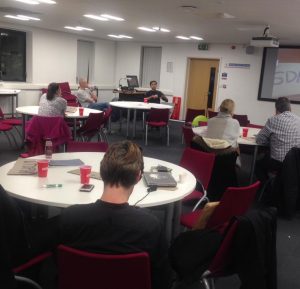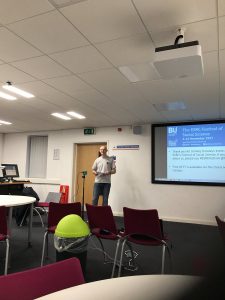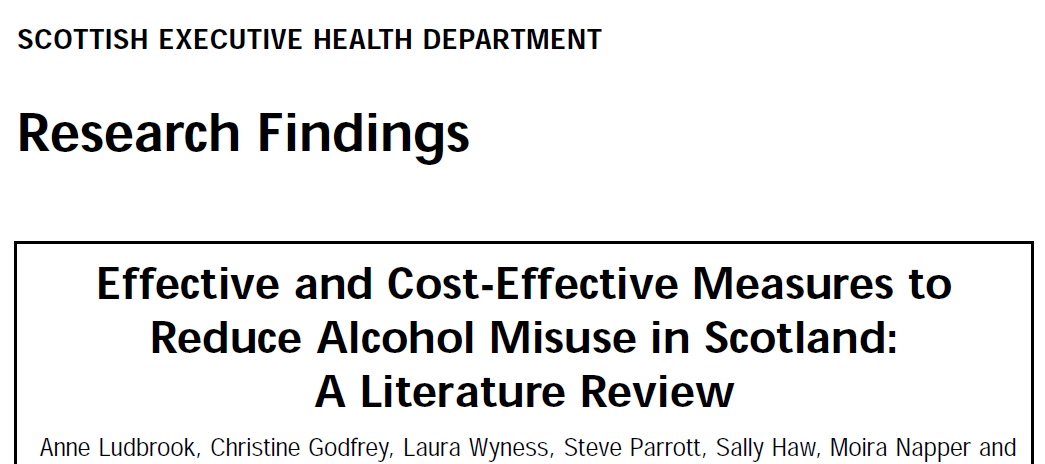Welcome!
There’s a veritable feast of HE policy for you to enjoy this week – lots on the budget and fees and funding, another section of the OfS consultation including quality, consumer protection, student protection plans and student transfers, and an update on engagement with schools.
Fees, loans, funding – and the Budget
Philip Hammond’s imminent delivery of the Budget on Wednesday 22 November has caused a mini flurry of organisations releasing reports and evidence aimed to influence. Here’s UUK’s.
It may be too late. Speaking at Wonkfest on 6 November Jo Johnson’s tone of certainty suggested plans were already ready. Of course it wouldn’t be the first time Johnson’s opinion has diverged from the government on expected policy, nor the first time the Prime Minister makes a last minute policy changing decision….
A Budget snippet that Johnson trailed at Wonkfest, to the consternation of the audience, was the suggestion that universities may pick up the tab for the repayment threshold reduction in the student loan repayment rate. While it may be unwise to speculate, your fearless Policy team will once again have a go:
Option 1: The Government could cut all tuition fees down to a lower level without replacing the lost income universities receive.
- This reduces the Government’s subsidy for student loans, however it is socially regressive, because it mostly helps those students who go on to earn most. .
- However, that is a purely economic analysis – there are many in the sector and politicians who believe that the impact of loans is not purely financial but has effect on behaviour, discouraging those from poorer backgrounds or who don’t expect to have high earnings from applying at all. That argument is of course countered by those who rely on the data that shows that student participation from low income backgrounds is going up steadily – and that at least until last year, there was a strong upward trend in applications overall (which may now have stalled). Note that OFFA do not support direct financial help as a method for increasing participation (they are usually talking about bursaries but the same may hold true for grants)
Option 2: The Government could reduce or abolish tuition fees for a specific group, such as students most in financial need.
- This would reduce the Government’s subsidy for student loans
- It is a socially progressive policy which supports the Government’s social mobility aims by tackling the debt adversity of the most disadvantaged students. It would help them to attack Labour’s (regressive) 2017 general election promise to abolish tuition fees – and winning back lost voters is of paramount importance to the Conservatives.
- It would be easy for the Government to implement this change quickly – as soon as the 2018/19 intake.
Under this scenario it would unlikely that the Government would replace the lost income to universities – so the impact of this would be to force efficiencies within the sector (Johnson is renowned for saying that HE institutions haven’t experienced austerity and have ‘had it good’ for a long time).
In effect, the fees from richer students would be subsiding the poorer students. Universities with the largest number of low income students would be most affected (with the Russell Group relatively unscathed).
This may be a well-planned long game – the Office for Students will have increased power to interrogate and publish admissions statistics to highlight “gaming” and the new Director of Access and Participation can sanction universities through the TEF for a fall in recruitment of low income students. The use of contextual admissions has also been debated widely in the media in recent weeks.
Option 3: The Government could decide to differentiate tuition fees based on subject, allowing subjects with the highest graduate earnings, employment rates and value added to charge the highest fees. The subject level TEF pilots have recently commenced (over 2 years), so such a decision would seem to be premature. However, a consultation in conjunction with the subject-level TEF outcomes ready for swift implementation in 2019 seems plausible. This approach might also mean that high cost subjects (e.g. STEMM) could remain at the highest chargeable fee, but the government could remove the current funding top ups and so reduce the overall cost (and reduce university income still further). See this Sunday Times article on differentiated fees per subject and institution.
Option 4: There have been suggestions of controlling the number of places for certain subjects based on the jobs needed by the economy. The Lords’ Economic Affairs Select Committee has been conducting a series of oral evidence sessions to investigate The Economics of Higher, Further and Technical Education. There is much more from this debate in the section below but this exchange is interesting:
- Willetts: Essentially, there is a group of high-earning courses: law, economics and management. There is a group of middle-earning courses, mainly STEM subjects. There are less well-paid graduates. The worst paid are in the performing arts. That is another reason why it proves very difficult to get into differential fees. We could charge more for graduates doing courses with high pay but how then would we exempt fees or justify charging higher fees for skills shortage areas such as STEM or medicine.
- Adonis: Tiered fees of that kind are precisely what the Australians have.
- Willetts: Yes, and it is not satisfactory. Australia is in a mess; it has static levels.
Option 5: Continuing in this vein the Government may reconsider the original TEF proposal to set limits on which institutions can charge the higher tier of fees. You will recall that the TEF proposal was to let Gold and Silver rated institutions raise their fees each year- linked to a percentage of the inflation cap, but this idea was postponed in response to feedback from the House of Lords. Using new employability and earnings data (to be included in the TEF from this year) the argument may now be that students studying at an institution likely to result in a highly paid job could reasonably be expected to pay more upfront. And a recent student opinion surveys suggest students would be willing buy into such a ‘guarantee’ (see UPP, page 17). Earlier in the term some institutions within the Russell Group were lobbying for this. However, given that far fewer WP students currently apply or are admitted into the Russell Group institutions this would negatively impact the Government’s social mobility agenda. Of course the government may believe that the OfS provisions on WP will address this.
Option 6: And of course other options that do not hit tuition fees are also available. The Sutton Trust (see later in this Policy Update) would like to see a return to grants. The IFS have published a paper on “options for reducing the interest rate on student loans and introducing maintenance grants” – as two key options for the government, which are being called for – including by UUK. they conclude that both of these options could be done at a reasonable cost in some circumstances but that both would benefit high earning graduates most and make very little difference to the rest. As with an across the board reduction in fees (see above) this would therefore be regressive, but might have a beneficial effect in terms of increasing participation.
Option 7: The current Office for Students regulatory consultation (see below) considers the future use of the teaching grant (the grant to universities topping up high cost subjects, specialist support and innovation). It states the OfS will continue the current approach “but it will also wish to deploy the teaching grant strategically, taking into account Government priorities. This will enable it to influence sector level outcomes…” Could this mean government inadvertently pushing institutions to conform to a similar set of ideals (to attract the money) at a time when institutions need to differentiate themselves to compete successfully for students in a squeezed market? If so it could also be contrary to the regional specialities (responding to place) within the industrial strategy.
And more: Differentiated caps and varying loans might seem unattractive to Government due to its complexities to both administer and communicate to the electorate. It is also poor timing given the significant press covering Steve Lamey’s dismissal from the Student Loans Company after claiming it was a “mess” and badly run.
In last week’s policy update we wrote about HEPI’s paper which revealed the extent to which it can be argued that tuition fees from all students, but particularly international students, subsidise research costs. Jo Johnson has long been rumoured to be vexed at the cross-subsidisation that exists within the sector. So will we see a shake-up aimed at research funding too? Given the instability associated with Brexit, the Government’s focus on industrial strategy to boost the economy, in particular their aim to capitalise on innovation and the commercialisation of research, and the recent cash injections announced for R&D might research survived unscathed? It is not a stretch to imagine that this would disproportionately benefit some institutions more than others given the current rhetoric around outcomes (outputs) and institutional status.
Lastly, Conservative think tank Bright Blue have proposed that universities themselves should contribute financially to the sustainability of the student-loans system by repaying the Government subsidy for student loans. This subsidy is currently estimated as 20-30p for each £1 lent. Bright Blue is quick to remind that the cost of such a subsidy wouldn’t be so high if universities didn’t all charge the highest fee. Bright Blue continues:
- “Certainly, there are an awful lot of expensive institutions producing graduates with earnings that mean their student loans must be subsidised, costing the taxpayer a lot of money…Thanks to the new Longitudinal Educational Outcomes (LEO) dataset., which uses HMRC and Student Loans Company data to accurately link nearly all graduate salaries to institutions attended, it is now possible to expose such universities. Institutions producing a disproportionate number of graduates who will need their student loans subsidised should contribute a levy to government.”
They go on to suggest that should universities charge less/contribute financially to the write-off subsidy this would enable the Government to better fund lower (FE) qualifications or more modular methods of study.
Delve into the detailed background and some other options in Jane’s blog on the Lighthouse Policy Group: Fees, loans and debt – an Autumn update.
In retrospect, after our dark musings on the Budget, Jo Johnson’s repeated reminder that the sector should not clamour for May’s announced review of HE (as it risks a less advantageous settlement than present) seem like wise words.
IFS – student loans and maintenance grants
As mentioned above, The IFS have published a paper on “options for reducing the interest rate on student loans and introducing maintenance grants” . Key findings are (our emphasis added):
Interest rates
- Positive real interest rates on student loans increase the debt levels of all graduates but only increase the lifetime repayments of higher-earning graduates. Removing them does not affect up-front government spending on HE, but it does slightly increase the deficit (due to the slightly confusing treatment of interest accrued on student debt in the government finances). More significantly, it also increases the long-run costs of HE due to the associated reduction in graduate repayments.
- Reducing the interest rates to RPI + 0% for everyone would reduce the debt levels of all graduates. Debt on graduation would be around £3,000 lower on average, while average debt at age 40 would be £13,000 lower. However, because of the link between income and interest in the current system, this cut would reduce the debts of the highest-earning graduates the most: the richest 20% of graduates would hold around £20,000 less debt at age 40 as a result of this policy, while the lowest-earning 20% of graduates would be just £5,500 better off in terms of debt held at the same age. This policy of switching to RPI + 0% would have no impact on up-front government spending on HE, but would cost the taxpayer £1.3 billion per year in the long run. It would be a significant giveaway to high-earning graduates, saving the richest 20% more than £23,000 over their lifetimes.
- A less costly policy would be to reduce interest rates to RPI + 0% while studying and leave rates unchanged after graduation. This would reduce the debt levels of all graduates at age 40 by around £5,000. It would be a significantly cheaper reform, costing around £250 million per year in the long run. Again, there is little impact on the repayments of low- and middle-earning graduates, while the highest-earning graduates would be around £5,000 better off over their lifetimes.
Maintenance grants
- Reintroducing maintenance grants in place of loans also has no impact on up-front government spending on HE, but it results in a large increase in the government cost of HE as measured by the current deficit, due to the differential treatment of loans and grants in government accounting. The long-run cost of this type of policy is typically much lower as a large proportion of the loans that grants would replace are not expected to be repaid anyway.
- Reintroducing grants of £3,500 under a similar system to that before 2016 would increase deficit spending by around £1.7 billion, but the long-run cost is only around £350 million. This reform would reduce the debt on graduation of students from low-income backgrounds taking a three-year degree by around £11,000.
- The beneficiaries from this change in terms of actual lifetime loan repayments are students from low-income backgrounds who go on to have high earnings. We estimate that students eligible for the full maintenance grant who are in the lowest-earning 60%of graduates would experience little or no change in lifetime repayments, while those who have earnings in the top 10% of graduates would save around £22,000.
Sutton trust – fairer fees
In contrast to the IFS paper above, The Sutton Trust, a social mobility foundation, has released Fairer Fees which proposes using a sliding scale of means-tested fees and the reintroduction of maintenance grants. This focuses not on the economic effect of changing the structure (which the IFS says is regressive) but on the psychological impact of reducing debt.
They state that implementing these measures would cost the Treasury the same amount as October’s reduction to the student loan repayment threshold. The benefits of the approach are that they would cut average student debt by 50% (psychological benefit encouraging the debt adverse to reconsider HE) but with the greatest beneficial effects on students from low household income backgrounds “it would slash debt among the 40% poorest students by 75%, from £51,600 down to £12,700, and mean those from the poorest backgrounds emerged with two thirds less debt than their better-off counterparts”. The report claims changing to the proposed fee policy would also benefit the Treasury as it would reduce the proportion of graduates never repaying their full loans from 81% to 56% with the overall proportion of debt not paid back to 35%. However, the Treasury may consider these figures in a different light as there would be fewer graduates required to repay their loans because of the reintroduction of maintenance grants. The report makes the following five recommendations:
- The government should implement its promised review of higher education funding. While the October reforms were welcome, there needs to be a thorough review of deeper reforms to the system. In particular, the crisis in part-time numbers should be addressed and bespoke solutions explored.
- Our proposed solution would be to introduce a system of means-tested fees which waives fees entirely for those from low income backgrounds, and increases in steps for those from higher income households. Significant ‘cliff edges’ between income bands should be avoided as much as possible.
- Maintenance grants, abolished in 2016, should be restored, providing support for those who need it most and reducing the debt burden of the least well-off, so that they graduate with lower debt than those from better-off backgrounds.
- Losses to higher education institutions through lower fee income should be replaced by increased teaching grants. While this involves greater upfront costs to the Exchequer, it also provides a lever by which government could promote the provision of courses in certain areas such as STEM. This teaching grant compensation would be adjusted to ensure that universities admitting intakes with lower average fee levels would not suffer any drop in income.
- Reducing access gaps to university, especially top universities, should be at the heart of government higher education policy. There needs to be a joined-up effort to tackle the persistent access gap for those from lower socio-economic backgrounds across all aspects of higher education, from student finance to the UCAS application process to the use of contextual data by universities in admissions.
Returning to the Sutton Trust’s recommendations it is interesting to note that it doesn’t tackle Lord Willetts’ (ex-Universities and Science Minister) calls for a differentiated loan system for mature and part time students. Willett believes an alternative loan scheme coupled with more diverse degree models would tackle the part time and mature falling student number crisis by ruling out both psychological and financial deterrents. We’ll await the Budget with baited breath to find out if the Sutton Trust (and their accompanying press attention: Huff Post, Independent, Metro) will influence Government spending.
The Economics of Higher, Further and Technical Education
The Lords’ Economic Affairs Select Committee has been conducting a series of oral evidence sessions to investigate The Economics of Higher, Further and Technical Education. The aim of the investigation is to consider whether the funding of post-school education is focused sufficiently on the skills the British economy needs. The transcripts of a particularly interesting session held on 10 October were released this week revealing a stimulating debate. The witnesses were Lord Willetts, Lord Adonis and Paul Johnson (Director of the Institute of Fiscal Studies). Some interesting bits are below:
One third of graduates won’t end up in a graduate job.
- Willetts: while they may not be in graduate employment when young they have a higher chance of securing graduate employment eventually.. Jobs considered non-graduate in the official standard occupational classifications are becoming more demanding, furthermore graduates seem to change the nature of the work they do just by virtue of their additional skills
Does what the HE system is trying to achieve match labour market outcomes, and how does it relate to other routes people could take?
- Adonis: due to high fee levels some careers that previously required graduates are now moving to take non-graduates. [Examples given were big accountancy firms and the Civil Service who are recruiting high-level apprentices into graduate roles]. Graduates who previously would have gone to university are “now seizing prestigious high-level apprenticeship opportunities as a way of going straight into careers without having to take degrees and take on debt. I see no reason in principle why that could not go a lot further.” “I see no reason in principle why accountancy, and even the law, which, if you go back two generations, were not graduate careers for many of those participating in them, could not once again become much more vocational careers, where people can train on the job, get qualifications that are recognised in their profession and not have to take on high levels of debt. That is much more the case in German-style economies where the number of graduates is much lower to start with.”
Is student debt discouraging people from attending university and will our economy suffer?
- Adonis: If you talk to sixth formers and those making decisions at 18 or 19, it is undoubtedly true that they are looking at alternatives to university in a way they were not a few years ago. As the number of high level apprenticeships increases they will become increasingly attractive. I suspect that we will see trends in both directions over the next few years. It will not by any means be just a trend towards more graduates.
- Paul Johnson: there is no evidence in the data that the fee system has had much effect on the numbers of people going into higher education. There may be an effect later on, and a group of young people may be making different choices, but overall, as far as we can tell, the numbers have not been affected.
Given that many graduates will not repay debt is there any argument to forgive debt in public sector shortages areas (teachers, doctors, nurses)?
- Adonis: “I tried hard to persuade the Treasury of the virtues of that argument. I did not get very far because it was convinced that… it would be left with almost no debt to collect.”
- Baroness Kingsmill: In the US debt is forgiven relative to the number of years worked in the dearth sector – for 5 years work you’re forgiven half the debt; for 10 years, you are forgiven the whole lot.
- Paul Johnson: rather than forgiving debt it’s more effective just to pay them more. Why do it in a roundabout way by forgiving debt?
On technical and vocational training – see the apprenticeships section below for more on this
University – seen as the only option
- The discussion turned to suggesting young people choose university because it’s the most obvious and easiest to understand route, that there is limited information or advice to support young people who might choose an alternative route.
- Willets responded: I agree with your point that other routes need to be clearly signalled, but I expect that in a modern western economy the managed transition to adulthood via three years of higher education is the mainstream route people will take. The danger of some people going down the alternative route is that I know who they will be. Eton will not be sending 25% of its kids on apprenticeships. You will reopen the social divide in participation by advantaged and disadvantaged groups.
Discussion of university place number controls was peppered through the committee hearing.
- Adonis argued against controlling numbers based on the jobs needed by the economy (referencing Robbins): How should we think of universities? Should we try to predict the jobs that people are going to do in 20 or 30 years’ time and allocate places at university in accordance with our predictions? He said, “No, we cannot know”. Instead, he wanted an open, flexible system, heavily influenced by the number of people with the capacity to benefit from higher education.
Decline in part time students – a different loan system needed
- Willets stated the decline in part time students was one of his greatest regrets in his time as Minister. He continued: The lesson I learn from it is that, rather than the seductive idea that you can have a single pot per person to pay for their education, you need different models for different groups. We extended loans to part-time students thinking it would have the same beneficial effect on them as the loans for full-time students, and all would be fine. The evidence is that the loans for part-time students have not worked. There has been low take up and people have been put off. We need new mechanisms for helping adults to study part-time, and I accept that the loan model has not delivered for them… If at any point we were looking at how to spend limited public money and what public spending would do, rather than spending it on compensating universities for a general reduction in fees, I have a list of things where I think there is a need. Certainly, a public spending package for adult learners, including helping mature students with the cost of tertiary education, be it university or not, would be a high priority.
International Students Fees/Cross-subsidisation
- Discussion on whether it was right to charge international students a greater fee took place -asking whether the international students were getting value for money.
- Adonis: if we were overcharging international students they would quite rapidly start to go elsewhere. We seem to be pretty price competitive with other major international education providers, and less expensive than many of the providers in the United States.
Charging differential fees – see the fees section above for this bit
On sandwich courses:
- Baroness Bowles of Berkhamsted: We often hear from companies that the graduates they recruit are not job-ready…do we have the right approach in what we are looking for from university education? Is it delivering?
- Willetts: I have a sneaking regard for…the extra year sandwich course. We should remember that, now, about half of all university students are doing vocational technical training courses that include time with an employer. We could have taken a different route, but Britain has ended up with a large amount of our professional and technical education now happening in a university context, and that is why university students are absolutely entitled to know which of those routes lead to good, well-paid jobs.
Flexible Degree Models
- Baroness Harding of Winscombe: How do we get more flexible university education. It feels better with one year or two-year courses and courses you can dip into through a decade, not just three years. That seems to me, from a business perspective, to be a more effective means of building the skills we might need in the modern economy than assuming that all institutions doing three-year courses from the age of 18 to 21 is the right answer.
- Lord Adonis: The failure to offer two-year degrees is a serious one on the part of universities. One of the effects of stuffing their mouths with money, which is what we have done over the last five years, has been to reduce significantly the incentives on them to do so. The Minister for higher education, in what I think was a very surprising change in the rules, is now allowing universities to charge the equivalent of three years’ worth of fees, taking out state loans over two years, as a way of encouraging them to offer two-year degrees when, surely, the rationale for two-year degrees ought to be that they should be at lower cost and at lower fees for the students.
Evolution of Apprenticeships
Wonkhe have published the blog: How apprenticeships can help productivity and social mobility which considers the evolution of apprenticeship policy. The article favours current government apprenticeship policy and on social mobility states: we have a unique once-in-a-generation opportunity to develop exciting work-based apprenticeship routes for new and underrepresented cohorts of learners. This will call for new patterns of apprenticeship delivery, new partnerships and new thinking.
There was some debate at the Economic Affairs Select Committee on this (see above for the rest);
- Willets: Sometimes the higher education debate is just the lightning rod for a debate about what kind of structure we think the British economy should have. The German educational and industrial models are closely linked. In a highly regulated labour market, with a large amount of licence to practise that you need to secure to do a whole range of jobs, and apprenticeship routes into those jobs, and provincial banks funding the companies that protect those jobs—in other words, a much more corporatist model—you can also have a whole series of regulated training routes into specific types of vocational employment.
- Adonis: “…if you are pretty clear what you want to do and which direction you want to go in and it is a commercial occupation, it is better to learn on the job and not accumulate between £60,000 and £100,000 of debt and be less work-ready at the age of 21 than you would be if you started at 18.”
And later on:
- Lord Layard: I should declare that I work in a university, and I know that the rate of return for university education is reasonable, but the rate of return for apprenticeship and further education is generally found to be a lot higher. Is it not peculiar that we have not put more resources and effort into developing that side of it?…Failure to develop the non-university vocational education route, both at lower and higher levels, is a major cause of the inequality of wages in our country. What is being done about the alternative?
- Adonis: I do not think that, somehow, we have a weak apprenticeship stream because we have a strong graduate stream. We have a weak apprenticeship stream because the state has not devoted resources, energy and commitment to creating a strong apprenticeship stream. Many of the countries that have them also have very strong universities. It is not a question of regulation; it is a question of proper funding streams, proper qualification systems and a commitment by employers to foster skills among their workforce, which historically has not happened here.
- Willetts: It is absolutely right that we should promote technical education; we find it in universities, and, by and large, around the world the places that do it well tend to seek university title in the end.
- Paul Johnson: We still do a very poor job for too many young people in vocational education. We need to focus more on apprenticeships. A serious issue is that Governments have tried, to some extent in the past, and have continually failed serially to make changes happen in an effective way. The serious question is why. Is it about political focus? Is it about resource? We certainly put a lot less resource into apprenticeships than we do into the university system.
Widening Participation – Schools
School Sponsorship
UUK have published Raising attainment through university-school partnerships, a good practice booklet of case studies detailing successful collaborative partnerships between universities and schools to raise pupil attainment and appetite for HE. The case studies are diverse and the booklet concludes that preserving flexibility of arrangements is a key aspect of the sector’s drive to raise standards in schools and remove the attainment gap between advantaged and disadvantaged pupils. Two recommendations are made:
- focus should be on ends rather than means, with great flexibility over how HE can support schools based on local context and need whilst meeting the Government’s objectives
- universities and their school partners need access to information on ‘what works’ – the Evidence & Impact Exchange (proposed by the Social Mobility Advisory Group) would support this by evaluating and promoting the evidence on social mobility, and assisting the direction of future partnerships to support attainment, access and student success
At the UUK Access and Student Success summit on Tuesday a Government representative made clear that broader (and effective) forms of partnership working are welcome but that they expect more universities to be involved in a school sponsorship style model.
Background: In December 2016 the Government made clear that they expected universities to be more interventionist proposing that all universities sponsor or set up a school in exchange for charging higher HE tuition fees. The Schools that work for everyone consultation garnered responses to the Government’s aim to harness universities’ expertise and resources to drive up attainment through direct involvement. (Note: the Government has not yet published a response to the consultation feedback.) When the snap election was announced the school sponsorship agenda featured in the Conservative’s manifesto. However, recently there has been little additional push from Government.
Working quietly in the wings throughout this period, OFFA have been urging institutions to make progress against a more diluted version of the Government’s aim – that universities take measures to support school pupils’ attainment and increase school collaboration through the Fair Access Agreements. In this they are acting on the strategic priorities the Government set out for them (originally in February 2016). While the push from OFFA has been to consider school sponsorship they appear to concur with the sector that this ‘one size fits all’ approach is not appropriate. Furthermore, it may run counter to social mobility objectives as encouraging an institution to focus the majority of its required WP spend on just one local school disadvantages pupils in other schools who will no longer receive the university’s support. This approach has faced much criticism from the education sector and from some MPs.
OFFA’s 2018-19 strategic guidance to institutions: It is now imperative to progress and scale up work with schools and colleges to accelerate the sector’s progress….[we are] asking you to increase the pace and scope of your work with schools to raise attainment, so that the teaching and learning outcomes for schools that work with universities are enhanced. The guidance went on to request detailed information on the specific attainment-focused cohorts, success criteria, and how the work is planned to grow over time.
What will the New Year bring? It seems unlikely that Government intend to drop the school sponsorship agenda. In spring/summer 2018 the Office for Students will come into its full powers, with a new Director, Chris Millward, at the Fair Access helm. We’ll see of this is a priority then.
Office for Students regulatory consultation
Continuing our series of updates on the OfS consultation – three weeks ago we looked at widening participation, this week we look at quality and standards, and protecting students as consumers. This section includes extensive quotes from the consultation document, reordered and edited to make it easier to follow. BU will be preparing an institutional response to this consultation. Policy@bournemouth.ac.uk will work with colleagues across BU and collate our response. (Wonkhe have helpfully grouped them all on one web page)
- Objective 2: all students, from all backgrounds, receive a high quality academic experience, and their qualifications hold their value over time in line with sector-recognised standards
| Consultation question:: Do you agree or disagree that a new Quality Review system should focus on securing outcomes for students to an expected standard, rather than focusing on how outcomes are achieved?
Consultation question:: Would exploring alternative methods of assessment, including Grade Point Average (GPA), be something that the OfS should consider, alongside the work the sector is undertaking itself to agree sector-recognised standards? |
The quality conditions are:
- B1: The provider must deliver well-designed courses that provide a high quality academic experience and enable a student’s achievement to be reliably assessed.
- B2: The provider must support students, including through the admissions system, to successfully complete and benefit from a high quality academic experience.
- B3: The provider must deliver successful outcomes for its students, which are recognised and valued by employers, and/or enable further study.
Quality code: “In parallel to this consultation, the UK wide Standing Committee for Quality Assessment (UKSCQA) has issued a consultation on revised expectations for the Quality Code.. The UKSCQA is working to conclude its consultation, and to finalise a revised set of expectations during Spring 2018. ….The new Quality Review system will provide a sound basis for the assessment of the quality and standards conditions, and be able to evolve with the increasing diversity of providers.”
New providers: “To facilitate greater diversity in provision and student experience, the OfS will make it easier for high quality providers to enter the sector. ….The OfS will also reduce the emphasis on a provider’s track record, which risks shutting out high quality and credible new providers.”
Grade inflation: “The OfS will annually analyse and arrange for the publication of information on grade inflation, directly challenging the sector where there is clear evidence of grade inflation”.
It was recently announced that the TEF will also include a new grade inflation metric on the proportion of students awarded different classifications over time. ….The TEF will therefore provider a counterweight to traditional ranking systems, some of which inadvertently encourage grade inflation by giving providers credit for the number of high-class degrees they award without further scrutiny.
A new condition will address this: C1: The provider must ensure the value of qualifications awarded to students at the point of qualification and over time, in line with sector-recognised standards.
Freedom of speech: Much heralded in the press around the launch of the consultation, there is actually very little about this (and it is not mentioned at all in the student summary). There is a lot more detail about the public interest proposal (see the section on the Public Interest Principles below), but this bit is relevant in this context:
- the provider has set up a code of practice to ensure compliance with the statutory duty in section 43 of the Education (No.2) Act 1986 and compliance with any other applicable obligations in relation to freedom of speech
- the provider ensures that its governing documents consider its obligations in relation to freedom of speech, and do not contain any provisions which contradict these obligations
- the governing body abides by its governing documents in practice with respect to any issues around freedom of speech
Objective 3: that all students, from all backgrounds, have their interests as consumers protected while they study, including in the event of provider, campus, or course closure
“Consumer rights are not limited to protecting students from the very worst situations where their provider or course closes entirely. It is also important that students understand what they can expect of their providers in terms of issues such as teaching hours and support available.”
- Condition D: “The provider must be financially viable and financially sustainable and must have appropriate resources to provide and fully deliver the higher education courses as advertised ….and enable the provider to continue to comply with all conditions of its registration.”
- Condition E4: “Providers must demonstrate in developing their policies and procedures governing their contractual and other relationships with students that they have given due regard to relevant guidance as to how to comply with consumer law.”
- Condition G: “The provider must cooperate with the requirements of the student complaints scheme run by the Office of the Independent Adjudicator for Higher Education including the subscription requirements and make students aware of their ability to use the scheme.”
Consumer law: “The provider is expected to submit a short self-assessment, describing how, in developing its policies and procedures governing their contractual and other relationships with prospective students (and relationships once those students have become current students), it has given due regard to relevant guidance about how to comply with consumer law.”
“In terms of the initial students’ contracts and consumer rights registration condition, the OfS will look at steps taken by providers in relation to prospective students i.e. it will look at policies and procedures governing contractual and other relationships with students who are commencing their studies from the academic year 2019/20, ensuring the policies and procedures are sound to govern the contractual and other relationships with those students once they have become current students.”
“The provider’s self-assessment should be accompanied by supporting evidence, demonstrating how it meets the condition. “
“In order to determine whether or not a provider is complying with the students’ contracts and consumer rights registration condition on an ongoing basis, the OfS’s judgement will be informed by the provider’s behaviour, information submitted by the provider, and any other information available to the OfS, such as whistleblowing / public interest disclosure reports submitted to OfS, or information from other relevant bodies, such as OIA, CMA or Trading Standards.”
| Consultation question: Do you agree or disagree that a student contracts condition should apply to providers in the Approved categories, to address the lack of consistency in providers’ adherence to consumer protection law? |
Student transfer: “Students should have, and be aware of, the option to transfer. For individual students, like the new parent changing to a part-time course so they can spend more time with family, or the carer who needs to move to another part of the country, but doesn’t want to give up their studies, transfer has the potential to improve their lives dramatically. For students collectively, the availability of student transfer empowers choice and helps drive competition. The OfS will work to ensure students are able to transfer fluidly within and between providers wherever it best meets their needs and aspirations.”
Condition H: “The provider must publish information about its arrangements for a student to transfer. If the provider lacks such arrangements, it must explain how it facilitates the transfer of a student.”
“The OfS will monitor whether providers have procedures in place to facilitate student transfer, along with information about students transferring into courses delivered by their institution …The OfS will use this reporting to raise the profile of student transfer for students, and highlighting successes, best practice, and areas where further work is needed for providers. If necessary, the OfS will go further to promote student transfer and raise awareness among students to help individuals make the choices that are right for them, or even commission research into the means by which transfer could be most effectively encouraged.”
| Consultation question: Do you agree or disagree with the proposed general ongoing registration condition requiring the publication of information on student transfer arrangements? How might the OfS best facilitate, encourage or promote the provision of student transfer arrangements? |
Student protection plans
“The OfS will be a market regulator, and as such it should not have to be in the business of having to prop up failing institutions, and neither should Government. The possibility of exit is a crucial part of a healthy, competitive and well-functioning market, and such exits happen already – although not frequently – in the higher education sector.”
“However, the OfS’ regulatory framework, and in particular the financial viability and sustainability condition and the OfS’s early warning approach to monitoring, are designed to prevent sudden and unexpected closures. This does not mean departmental, campus or even institutional closures will never occur. Higher education providers are autonomous institutions, and as such are entitled to make their own decisions about any future business model or viability of any particular course or subject.”
“The OfS’ interest is in ensuring that such changes and closures do not adversely affect students and their ability to conclude their studies and obtain a degree. This is why it will be a registration condition for all providers in the Approved categories to have an agreed student protection plan in place (see condition F) – the core purpose of which will be ensuring continuity of study.”
Condition F: “The provider must have in force a student protection plan which has been approved by the OfS (which sets out what actions they will take to minimise any impact on the students’ continuation of study should the provider discontinue the course, subject, discipline or exit the market completely) and the provider commits to taking all reasonable steps to comply with the provisions of that plan.”
“Student protection plans will set out what students can expect to happen in the event of course, campus or department closure, or if an institution exits the market. The plans must be approved by the OfS, and be easily available to current and prospective students. Providers with a low risk of unplanned closure would be required to have light-touch plan “
“Any measures must be feasible and practicable, and be backed up by clear implementation plans. When agreeing SPPs with the OfS the provider may be expected to provide some sort of reassurance on the financial position, which may include additional measures such as financial guarantees, or escrow type arrangements where a higher risk of market exit specifically is identified.”
Electoral registration – The HERA included a provision that the OfS could require providers to take steps to facilitate electoral registration. This is a provider level requirement that does not fit easily under the headings. The consultation says that:
“A healthy democratic society is one which has social justice at its heart. It is also dependent on the active participation of its citizens. The Government is, therefore, committed to helping ensure that everyone who is eligible to vote is able to do so, including students. However, people cannot vote until they have registered to vote and higher education providers have a major part to play in achieving this.“
“The condition will require higher education providers to cooperate with EROs, in accordance with such steps as the OfS considers appropriate. The Secretary of State will issue guidance under section 2(3) of HERA…subject to the outcome of this consultation, we expect this Ministerial Guidance is likely to:
- reinforce the requirement for higher education providers to co-operate with EROs’ requests under Regulation 23 of the Representation of the People (England and Wales) Regulations 2001 for information on students for the purposes for electoral registration. We want providers to understand that they have a legal obligation to co-operate with these requests
- include a direction for higher education providers to work in partnership with their local electoral services team to actively promote electoral registration amongst their student populations”
“The Government proposes to review and evaluate the overall effectiveness of this condition, once it has been implemented over a sufficient period to facilitate the gathering of appropriate data in terms of numbers of students who have registered. The evaluation will examine how effective the condition has been at helping increase successful applications from students to join the electoral register. “
More to follow on other aspects of the consultation
Brexit – Parliamentary Question
Q – Dr Matthew Offord: What assessment he has made of the capacity within UK universities and research institutes to continue to investigate the European geo-political area after the UK leaves the EU.
A – George Eustice: The Department has made no such assessment but the Prime Minister explained in her Florence Speech that the UK will continue to take part in those specific policies and programmes which are greatly to the UK and the EU’s joint advantage, such as those that promote science, education and culture.
Other news
Advertising Standards: The Advertising Standards Authority (ASA) has upheld disputes with six universities claiming to be top or within a top percentage for student satisfaction, graduate prospects, academic discipline, and global or national ranking. Leicester, East Anglia, Strathclyde, Falmouth, Teesside and the University of West London have all been instructed to remove their misleading content. The ASA has stated universities should substantiate such comparative statements by ensuring that the data behind the claim is sufficiently robust and can stand up to impartial interrogation. New guidance for universities on the required standards has been published here.
Press coverage of the ASA’s decisions: BBC, Guardian, and the Times.
Wonkhe have a guest blogger, Charles Heymann, who argues for universities to radically rethink their marketing straplines focusing on the institution’s values.
It remains to be seen if the ASA decisions, which threaten all top claims, will affect the sector’s preoccupation with rankings or influence student and parental opinion of the validity of such rankings.
Undergraduate employment: The Office for National Statistics has been researching undergraduate students’ employment whilst studying. In 2014/15 72.7% of students were in paid employment. Interestingly the South West had the highest employment percentage (77.6%) and London the lowest. Particularly notable for BU is that in East Dorset 9 out of 10 students were counted within the employment figures.
Konfer: This week saw the official launch of phase 2 of Konfer – a collaborative initiative from the National Centre for Universities and Business, the Research Councils, and HEFCE. It aims to open up research, researchers, and services within UK universities to businesses and other organisations looking for collaboration or new ideas, and to translate the research into jobs, innovation and economic growth. Described as ‘Google meets LinkedIn for university collaboration’ it utilises a search facility (search for an expert, a paper, a piece of equipment, a business or charity partner) to connect with the supplier.
David Sweeney, Director of Research and Knowledge Exchange at HEFCE and Executive Chair Designate of Research England, said: “konfer promotes stronger commercialisation, business and policy links and wider societal engagement with publicly funded research. It opens out what universities and research institutes do to a wider audience and I’m delighted to see it reaching full launch stage following development work with universities and businesses of all sizes.”
BU’s Research and Knowledge Exchange Office engaged with Konfer during its early development and continue to develop our involvement.
Immigration: The Home Office has doubled the number of Tier 1 visas, available to those with exceptional talent or promise in the technology, arts, creative and sciences industries. Two thousand visas will now be made available for those endorsed by Tech City UK, the Arts Council of England, the British Academy, the Royal Society or the Royal Academy of Engineering. (WONKHE)
Policy Research Principles: The National Audit Office (NAO) has published their review Cross-government funding of research and development concluding that a more joined up approach is needed for some science based cross-departmental research areas within leadership, research principles and coordinated, prioritised funding arrangements. It concludes that BEIS and UKRI will play leading roles.
“Government needs a coherent view of the UK’s research strengths relative to other nations and analysis of funding in key areas of research, so that it can prioritise areas where activity is lagging behind and ensure the UK is investing in the right areas…there is a risk that funders do not have coherent data across research areas on capability, funding gaps, or outcomes of research and development to inform decisions on national priorities and strategic direction..” (Amyas Morse Head of NAO)
Subscribe!
To subscribe to the weekly policy update simply email policy@bournemouth.ac.uk
JANE FORSTER | SARAH CARTER
Policy Advisor Policy & Public Affairs Officer
65111 65070
Follow: @PolicyBU on Twitter | policy@bournemouth.ac.uk




 community ‘BU: Research and Knowledge Exchange Development Framework’. From here, you can navigate through the pathways (see left hand side of screen) to the Funding from Charities pathway to find the session materials.
community ‘BU: Research and Knowledge Exchange Development Framework’. From here, you can navigate through the pathways (see left hand side of screen) to the Funding from Charities pathway to find the session materials. Debbie Barnett, Donor Milk Bank Coordinator of the Scottish Greater Glasgow and Clyde Donor Milk Bank, and Jean-Charles Picaud, President of EMBA, welcoming the conference attendants.
Debbie Barnett, Donor Milk Bank Coordinator of the Scottish Greater Glasgow and Clyde Donor Milk Bank, and Jean-Charles Picaud, President of EMBA, welcoming the conference attendants.  I presented the results of our national milk bank survey, which we conducted earlier this year. The study was the first national audit of human milk banking practices in the U.K. with the aim to protecting and preserving omega-3 and omega-6 long chain polyunsaturated fatty acids in donor human milk. The survey identified large variations in all practices of human milk banking, including, donor selection, transportation, and storage and handling of donor milk, and nutritional information provided for donors.
I presented the results of our national milk bank survey, which we conducted earlier this year. The study was the first national audit of human milk banking practices in the U.K. with the aim to protecting and preserving omega-3 and omega-6 long chain polyunsaturated fatty acids in donor human milk. The survey identified large variations in all practices of human milk banking, including, donor selection, transportation, and storage and handling of donor milk, and nutritional information provided for donors.







 Have you noticed this box on the BU Research Blog?
Have you noticed this box on the BU Research Blog?

 We are delighted to announce that the Research Photography Competition has returned for its fourth year and is now open for entries!
We are delighted to announce that the Research Photography Competition has returned for its fourth year and is now open for entries! Need inspiration?
Need inspiration?












 Beyond Academia: Exploring Career Options for Early Career Researchers – Online Workshop
Beyond Academia: Exploring Career Options for Early Career Researchers – Online Workshop UKCGE Recognised Research Supervision Programme: Deadline Approaching
UKCGE Recognised Research Supervision Programme: Deadline Approaching SPROUT: From Sustainable Research to Sustainable Research Lives
SPROUT: From Sustainable Research to Sustainable Research Lives BRIAN upgrade and new look
BRIAN upgrade and new look Seeing the fruits of your labour in Bangladesh
Seeing the fruits of your labour in Bangladesh ECR Funding Open Call: Research Culture & Community Grant – Apply now
ECR Funding Open Call: Research Culture & Community Grant – Apply now ECR Funding Open Call: Research Culture & Community Grant – Application Deadline Friday 12 December
ECR Funding Open Call: Research Culture & Community Grant – Application Deadline Friday 12 December MSCA Postdoctoral Fellowships 2025 Call
MSCA Postdoctoral Fellowships 2025 Call ERC Advanced Grant 2025 Webinar
ERC Advanced Grant 2025 Webinar Update on UKRO services
Update on UKRO services European research project exploring use of ‘virtual twins’ to better manage metabolic associated fatty liver disease
European research project exploring use of ‘virtual twins’ to better manage metabolic associated fatty liver disease